
The UCI Claire Trevor School Of The Arts’ Department Of Drama opens its 2016-2017 season with a powerful, superbly performed big-stage revival of Jason Robert Brown and Alfred Uhry’s Parade.
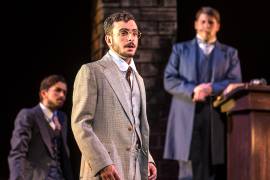 It takes guts and chutzpah to write a musical about a hundred-year-old anti-Semitism-fueled crime that remains today one of the most horrific miscarriages of justice in United States history, but this is precisely what Jason Robert Brown and Alfred Uhry pulled off in 1998’s Tony-winning Parade.
It takes guts and chutzpah to write a musical about a hundred-year-old anti-Semitism-fueled crime that remains today one of the most horrific miscarriages of justice in United States history, but this is precisely what Jason Robert Brown and Alfred Uhry pulled off in 1998’s Tony-winning Parade.
Brown’s eclectic collection of songs run the gamut from gospel to pop rock to rhythm and blues to emotional ballads. Likewise, no one writes with more insight about being Jewish in the South than Uhry, whose book moves back and forth through time, as flashbacks reveal the events leading up to Frank’s arrest and trial.
In a stirring prologue, a young confederate soldier (Ethan Thomas Bell) sings a hymn to Georgia, by the end of which he has morphed into his elderly contemporary self (Mark Metzger), a reminder that the Civil War was no distant memory at the time of Frank’s trial, but a very real one for the citizens of Atlanta.
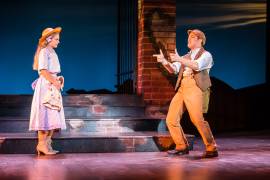 Parade’s tale of injustice then begins, with young Frankie Epps (Bell again) inviting vivacious pencil factory worker Mary Phagan (Madison Dietrich) to “The Picture Show,” a date for which Mary never arrives. Since we have just seen her visit the office of factory manager Leo Frank (Jacob Ben-Shmuel) to claim her week’s meager wages in a scene that Parade’s book cuts deliberately short, it is left to us (and to the citizens of Marietta) to fill in the blanks, though in markedly different ways.
Parade’s tale of injustice then begins, with young Frankie Epps (Bell again) inviting vivacious pencil factory worker Mary Phagan (Madison Dietrich) to “The Picture Show,” a date for which Mary never arrives. Since we have just seen her visit the office of factory manager Leo Frank (Jacob Ben-Shmuel) to claim her week’s meager wages in a scene that Parade’s book cuts deliberately short, it is left to us (and to the citizens of Marietta) to fill in the blanks, though in markedly different ways.
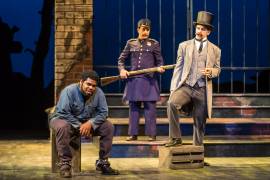 Evidence soon piles up against the “Yankee Jew,” much of it coming from janitor Jim Conley (Taylor Fagins), damning albeit falsified evidence that ultimately leads to Leo’s arrest for murder and the kangaroo court that was his trial.
Evidence soon piles up against the “Yankee Jew,” much of it coming from janitor Jim Conley (Taylor Fagins), damning albeit falsified evidence that ultimately leads to Leo’s arrest for murder and the kangaroo court that was his trial.
Meanwhile, his mouse of a Southern Jewish wife Lucille (Kelsey Jenison) informs her flabbergasted husband of her intention to leave town during his trial, wifely devotion trumped by fear.
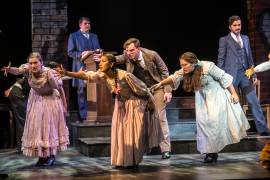 In court, prosecutor Hugh Dorsey (Maximilian DeLoach) interrogates a trio of young factory girls (Leya Van Doren, Cailen Fu, and Rachel Menendez) who testify under oath that Leo had invited Mary to “Come Up To My Office,” incriminating evidence accompanied by a vivid fantasy depiction of the “sex fiend” the townsfolk of Marietta believe Leo to be. Mary’s mother (Rachel Williams) then takes the stand, after which Conley concocts the elaborate lie that seals Frank’s fate.
In court, prosecutor Hugh Dorsey (Maximilian DeLoach) interrogates a trio of young factory girls (Leya Van Doren, Cailen Fu, and Rachel Menendez) who testify under oath that Leo had invited Mary to “Come Up To My Office,” incriminating evidence accompanied by a vivid fantasy depiction of the “sex fiend” the townsfolk of Marietta believe Leo to be. Mary’s mother (Rachel Williams) then takes the stand, after which Conley concocts the elaborate lie that seals Frank’s fate.
Myrona DeLaney directs her student cast with imagination (bringing back Mary for her mother’s courtroom plea, involving Dorsey in the pivotal penultimate scene), visual flair (shown off particularly in full-cast production numbers), and focus on storytelling and character all the way down to the smallest roles.
Even cameos get rendered with clear attention to detail, from Mariah Bakaimani-Roberts’ Minnie, to Eriel Brown’s Angela, to Lawrence Turner’s Riley, to dance captain/swing Mata Barr’s Jeanie Watson, to Rosemary O’Neill’s Sallie Mae.
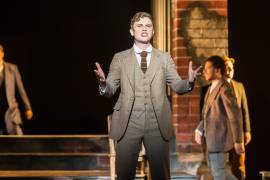 Multiple-role assignments allow Williams (also Sally Slaton), Dietrich (also Lila), Metzger (also Judge Roan and Guard), Tyler Marshall (Officer Ivey, Luther Rosser, Mr. Peavy, and Guard), and Nicholas Ehlen (Detective Stamos and power-hungry newspaper editor Tom Watson) to shine brightly, the latter in particular showing off some of the evening’s finest pipes in “Where Will You Be When The Time Comes.”
Multiple-role assignments allow Williams (also Sally Slaton), Dietrich (also Lila), Metzger (also Judge Roan and Guard), Tyler Marshall (Officer Ivey, Luther Rosser, Mr. Peavy, and Guard), and Nicholas Ehlen (Detective Stamos and power-hungry newspaper editor Tom Watson) to shine brightly, the latter in particular showing off some of the evening’s finest pipes in “Where Will You Be When The Time Comes.”
Fagins and Daniel Solomon (Newt Lee) too reveal potent vocal chops, the former in “Blues: Feel the Rain Fall,” the latter in “I Am Trying To Remember,” while factory girls Van Doren (Iola Stover), Fu (Monteen), and Menendez (Essie) make strong impressions as well.
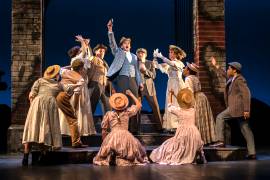 Tops among supporting cast stars are David Šášik (defining charisma as eager-beaver reporter Britt Craig and vanishing entirely into stuffy but fair-minded Governor Slaton), Bell (revealing an exquisite tenor as Young Soldier and plenty of boyish pep as Frankie Epps), and DeLoach (proving to hiss-worthy effect that 1910s politicians could be every bit as power-hungry as they are today)
Tops among supporting cast stars are David Šášik (defining charisma as eager-beaver reporter Britt Craig and vanishing entirely into stuffy but fair-minded Governor Slaton), Bell (revealing an exquisite tenor as Young Soldier and plenty of boyish pep as Frankie Epps), and DeLoach (proving to hiss-worthy effect that 1910s politicians could be every bit as power-hungry as they are today)
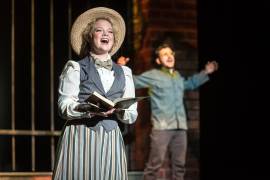 And then there is Jenison, cast daringly against type as a Lucille whose blonde-next-door beauty would have made it easy for her to “pass” in Christian Atlanta, proven irresistible to dark-moody Yankee Leo, and made her the last person you’d expect to show moxie in times of trouble. No wonder then that Lucille’s Act Two metamorphosis proves particularly impressive here, and as for Jenison’s vocals, well they are simply sublime.
And then there is Jenison, cast daringly against type as a Lucille whose blonde-next-door beauty would have made it easy for her to “pass” in Christian Atlanta, proven irresistible to dark-moody Yankee Leo, and made her the last person you’d expect to show moxie in times of trouble. No wonder then that Lucille’s Act Two metamorphosis proves particularly impressive here, and as for Jenison’s vocals, well they are simply sublime.
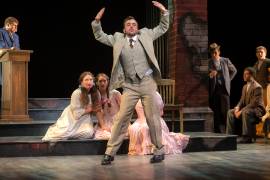 Still there could be no Parade (indeed I doubt UCI would have even dared program it) were it not for the absolutely brilliant Ben-Shmuel, whose Act One fearlessness in making Leo as arrogant and patronizing as any Northerner could get in Deep South Georgia make his second act transformation into a vulnerable, frightened, loving human being all the more heartrending. In both vocal and acting chops, Ben-Shmuel gives any Broadway star a run for his money in addition to showing off some nifty footwork in “That’s What He Said.”
Still there could be no Parade (indeed I doubt UCI would have even dared program it) were it not for the absolutely brilliant Ben-Shmuel, whose Act One fearlessness in making Leo as arrogant and patronizing as any Northerner could get in Deep South Georgia make his second act transformation into a vulnerable, frightened, loving human being all the more heartrending. In both vocal and acting chops, Ben-Shmuel gives any Broadway star a run for his money in addition to showing off some nifty footwork in “That’s What He Said.”
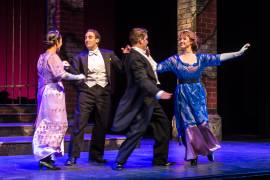 The latter number is just one of master choreographer Andrew Palermo’s numerous contributions to UCI’s Parade, as are “The Dream Of Atlanta” and “Real Big News” with their striking blend of slow-mo and freeze-frame moves, and “Pretty Music,” showcasing particularly nimble footwork by Barr, Bell, Fu, and Marshall..
The latter number is just one of master choreographer Andrew Palermo’s numerous contributions to UCI’s Parade, as are “The Dream Of Atlanta” and “Real Big News” with their striking blend of slow-mo and freeze-frame moves, and “Pretty Music,” showcasing particularly nimble footwork by Barr, Bell, Fu, and Marshall..
Palermo’s stunning dances make it all the more regrettable that the surreal mix of celebration and devastation that ought to end Act One with a wallop has somehow ended up cut.
Cast vocals shine, as does Parade’s nine-member pit orchestra (Louis Allee, Benet Braun, Adrienne Geffen, Lex Leigh, Sharon Ray, Carlos Rivera, James Saunders, Oliver Walton, and Chris Wilson) under Daniel Gary Busby’s expert musical direction.
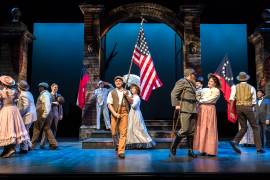 Scenic designer Leah Ramillano’s brick pillars and arches provide an effective backdrop throughout, Leon Wiebers’ period costumes are as fine as any you’d see on a major regional stage, Wes Chew’s lighting adds dazzle and dramatic punch (the silhouettes are a particularly nice touch), and Matt Glenn’s sound design provides a pitch-perfect orchestral-vocal mix.
Scenic designer Leah Ramillano’s brick pillars and arches provide an effective backdrop throughout, Leon Wiebers’ period costumes are as fine as any you’d see on a major regional stage, Wes Chew’s lighting adds dazzle and dramatic punch (the silhouettes are a particularly nice touch), and Matt Glenn’s sound design provides a pitch-perfect orchestral-vocal mix.
Liv Scott is production stage manager. Phil Thompson is vocal/dialect coach.
Like the nine UC Irvine productions I’ve seen before it, Parade reveals some of the finest and most promising musical theater talent in town. A daring move on the part of the UCI Department Of Drama, it gives professional Parades more than a run for their money and O.C. audiences more than enough reason to cheer.
Irvine Barclay Theatre, 4242 Campus Drive, Irvine.
http://www.arts.uci.edu
–Steven Stanley
November 18, 2016
Photos: Paul Kennedy
Tags: Alfred Uhry, Jason Robert Brown, Orange County Theater Review, UC Irvine



 Since 2007, Steven Stanley's StageSceneLA.com has spotlighted the best in Southern California theater via reviews, interviews, and its annual StageSceneLA Scenies.
Since 2007, Steven Stanley's StageSceneLA.com has spotlighted the best in Southern California theater via reviews, interviews, and its annual StageSceneLA Scenies.







 COPYRIGHT 2025 STEVEN STANLEY :: DESIGN BY
COPYRIGHT 2025 STEVEN STANLEY :: DESIGN BY